THEATRE REVIEW
Getting to grips with a diva: Sandra Prinsloo plays Maria Callas in ‘Master Class’
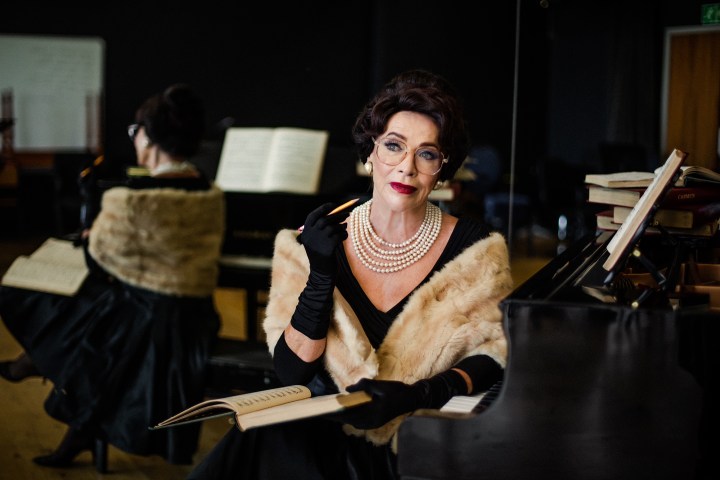
To mark the occasion of the 100th anniversary of the birth of Maria Callas, Sandra Prinsloo is playing the temperamental opera diva in Terrence McNally’s award-winning play that poses questions about the nature of art while revealing both the magic and the heartache of being a great artist.
On a bright, characteristically wind-blasted summer’s day in Cape Town, actress Sandra Prinsloo was on stage for a technical rehearsal of Terrence McNally’s 1995 play, Master Class.
It was one week before the show’s opening on 22 February and the cast, having just made the move from the rehearsal room to the theatre, were finding their feet: familiarising themselves with the physical dimensions of the stage, getting to grips with the bright lights, adapting to the weird acoustics, and – on this particular day – putting up with noise from somewhere in the roof where technicians were fixing the Theatre on the Bay’s air-conditioning system.
Being rehearsed was the play’s second half. Among the technical nuts and bolts was getting the volume of the piano perfectly balanced in a scene where Prinsloo, as the late, great opera personality Maria Callas, instructs a young professional singer as part of a public master class at Juilliard.
There was a minor debacle concerning the placement of a musical score, a prop whose position on stage was somehow crucial to the flow of events despite going entirely unnoticed to anyone in the audience.
And there was some tinkering with the time taken for Prinsloo’s Callas to drink a glass of water; even the manner in which the water was poured involved some comedic business that audiences would presumably pick up on.
As the director sought to fine-tune spotlight positions, music cues and placements, not to mention the number of steps that could be safely taken during a speech before someone could accidentally fall off stage because the footlights were so blindingly bright, Prinsloo popped in and out of character, up and down a vast emotional range, with imperceptible ease.
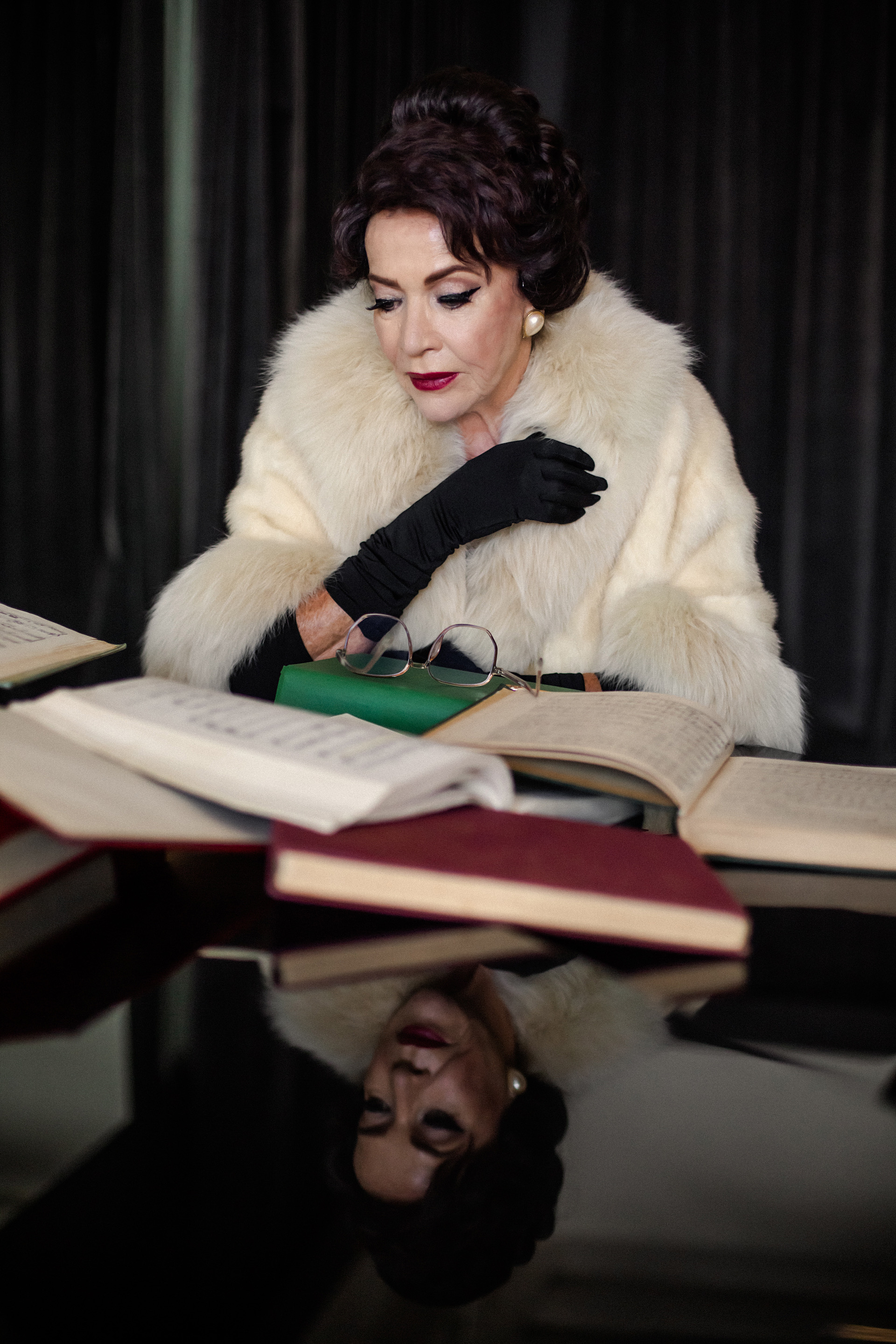
Sandra Prinsloo poses as Maria Callas in ‘Master Class’. Image: Annène van Eeden
Electrifying arias
Even during this slightly manic stop-start-pause-rewind rehearsal, Callas was well and truly under Prinsloo’s skin.
The play, which won the 1996 Tony Award for Best Play (and Best Actress), is based on a series of opera master classes that Callas gave in New York in 1971 and 1972, several years after her singing career had ended.
As a drama, it is not only fertile ground for McNally’s deep and textured literary voice, but also an engrossing exploration of Callas’s inner life. It is a strongly worded treatise about the value of art and the requirements of a true artist.
It also features electrifying arias performed by several Cape Town Opera soloists, moments in which the audience is reminded of music’s ability to captivate the soul.
And, of course, it’s a juicy role for Prinsloo to sink her teeth into.
McNally’s portrait of Callas shows her just as hard-nosed and bitchy as many believed her to have been. At times scathing, her words are riddled with sarcasm, even venom, as she reveals the high standards to which she believes great artists should be held.
In other moments, she’s heartbreakingly tender, her own pains and foibles stirringly revealed. At its heart, though, the play is almost a sermon about the dedication required to become a great artist, someone who reaches beyond natural talent and training, someone who devotes the entirety of their being to the craft.
Dedicated perfectionist
Callas’s dedication to her art was, it’s revealed, all-consuming. “I am not interested in just singing,” she tells one of the singers who underwhelms her with what, in her estimation, is an aria lacking the full force of life. For the true artist, it is not enough to simply showcase skill and talent. The performance must consume the artist.
“I think that’s what is marvellous about Callas,” Prinsloo says in the theatre’s foyer during her mid-rehearsal lunch break. “She’s tough – but she is correct. There are a lot of people walking around saying Callas was such a bitch. McNally has probably made her a bit more of a bitch than I think she actually was, but she wasn’t just a bitch.
“She was dedicated; she was a perfectionist. She worked so hard at her craft and she expected that from everybody else, and if they wouldn’t give it, then she had a temperament and gave people a hard time. And rightly so, I think.
“If they didn’t want to come to the party, if they didn’t want to be better than what they were, if they didn’t want to rise to her standards, then she was difficult. She believed you should do it right, otherwise not bother doing it at all. She believed that artists must go there, go to the hard and difficult places.”
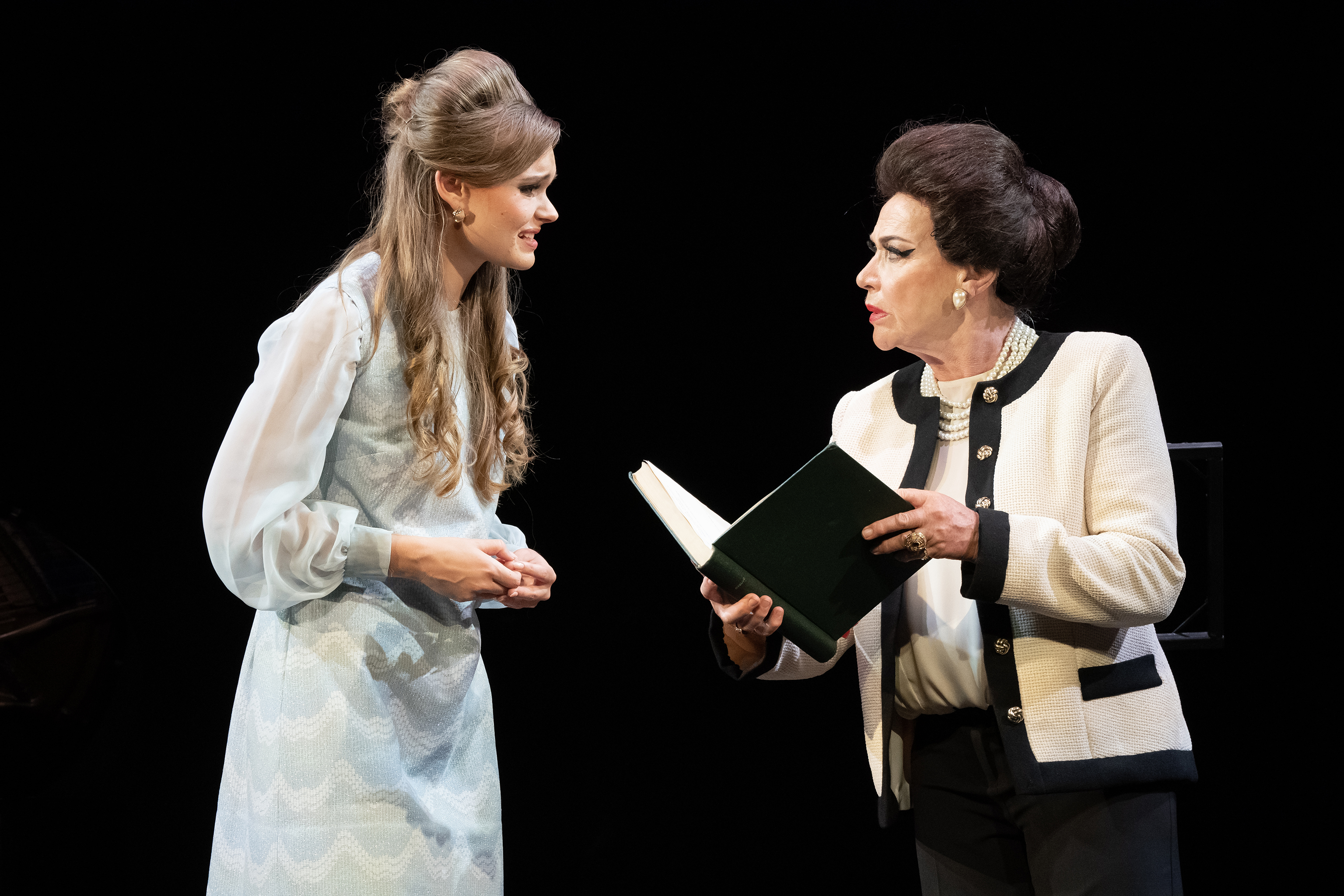
Alida Scheepers as Sophie and Sandra Prinsloo as Maria Callas in ‘Master Class’. Image: Joan Ward
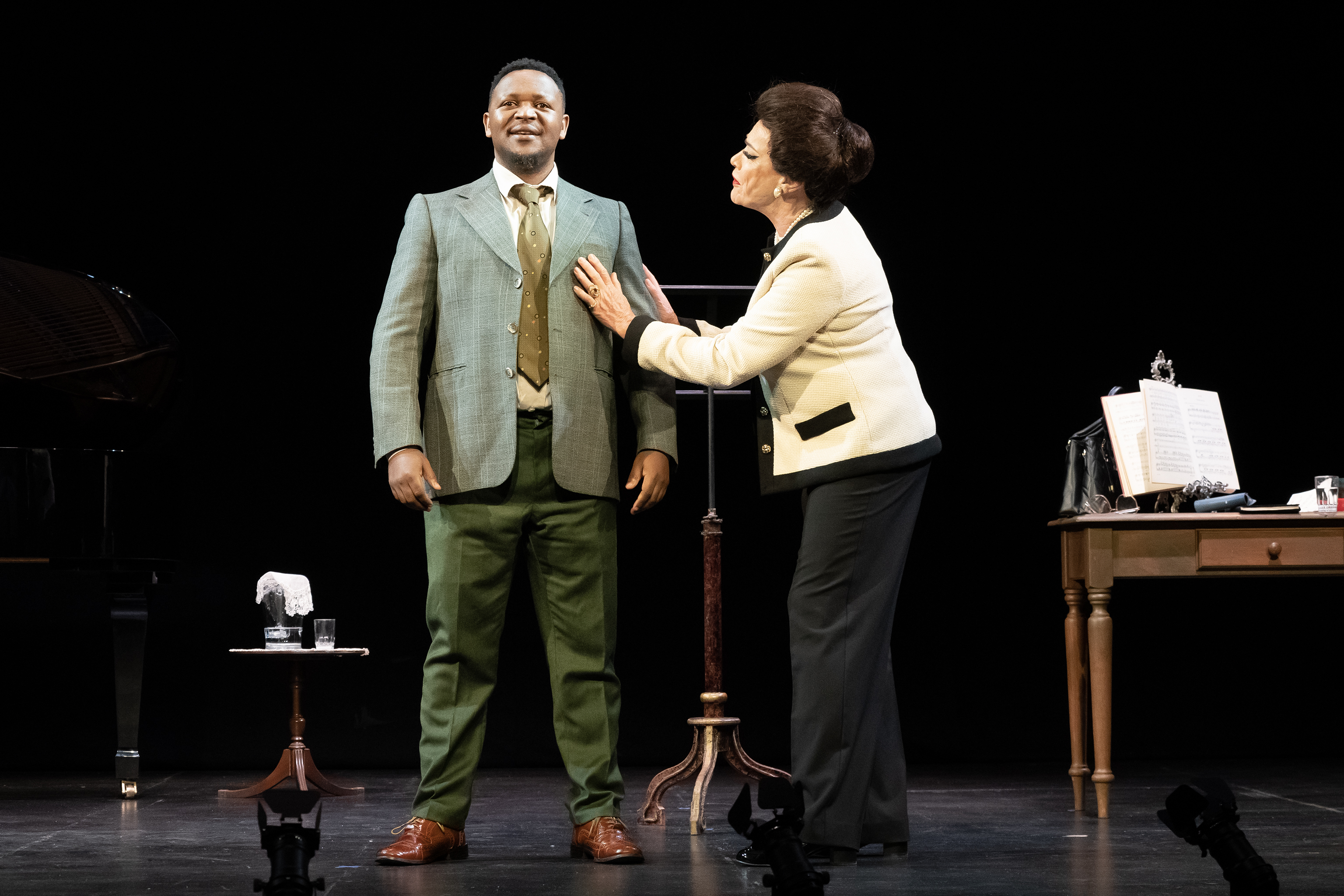
Tylor Lamani as Toni and Sandra Prinsloo as Maria Callas in ‘Master Class’. Image: Joan Ward
Search for truth
Prinsloo is speaking from experience, as someone who has, in her career, frequently explored the dark cracks and dangerous corners to bring forth the truth of her characters.
She describes how, in the 1980s, during rehearsals for Marat/Sade, director Barney Simon sent her into the streets of Newtown, alone and in character as an asylum inmate. Around her, large and angry crowds were protesting and cars were on fire.
In her more recent one-woman shows, she has navigated the tricky psychology of dementia and has had to examine what it means to accept death as a natural consequence of life.
Those can be difficult spaces to venture into, she says. But taking herself into tough emotional terrain is her job.
“I think I’m serious in my search for truth,” she says. “I’m not afraid to show things that other people might not want to do. I do what I do and I give it everything I can.”
Although McNally’s script lays on Callas’s hard side quite thickly, Prinsloo’s portrayal of her manages to bring the quintessential diva down to Earth, exposing the fiery prima donna’s vulnerability, making her sympathetic – sometimes even in spite of herself.
There is such tenderness in Prinsloo’s manner, such a grasp of Callas the human being, of someone who is so much more than her larger-than-life public persona might let on.
“Yes, I fall in love with all my characters,” Prinsloo says.
What makes Prinsloo so easy to watch and such a potent presence on stage (even during rehearsals) is perhaps down to “being in the moment”, that skill great actors possess of stepping so completely into the skin of their characters that they are able to transport the audience to another time and place, to let us experience another reality.
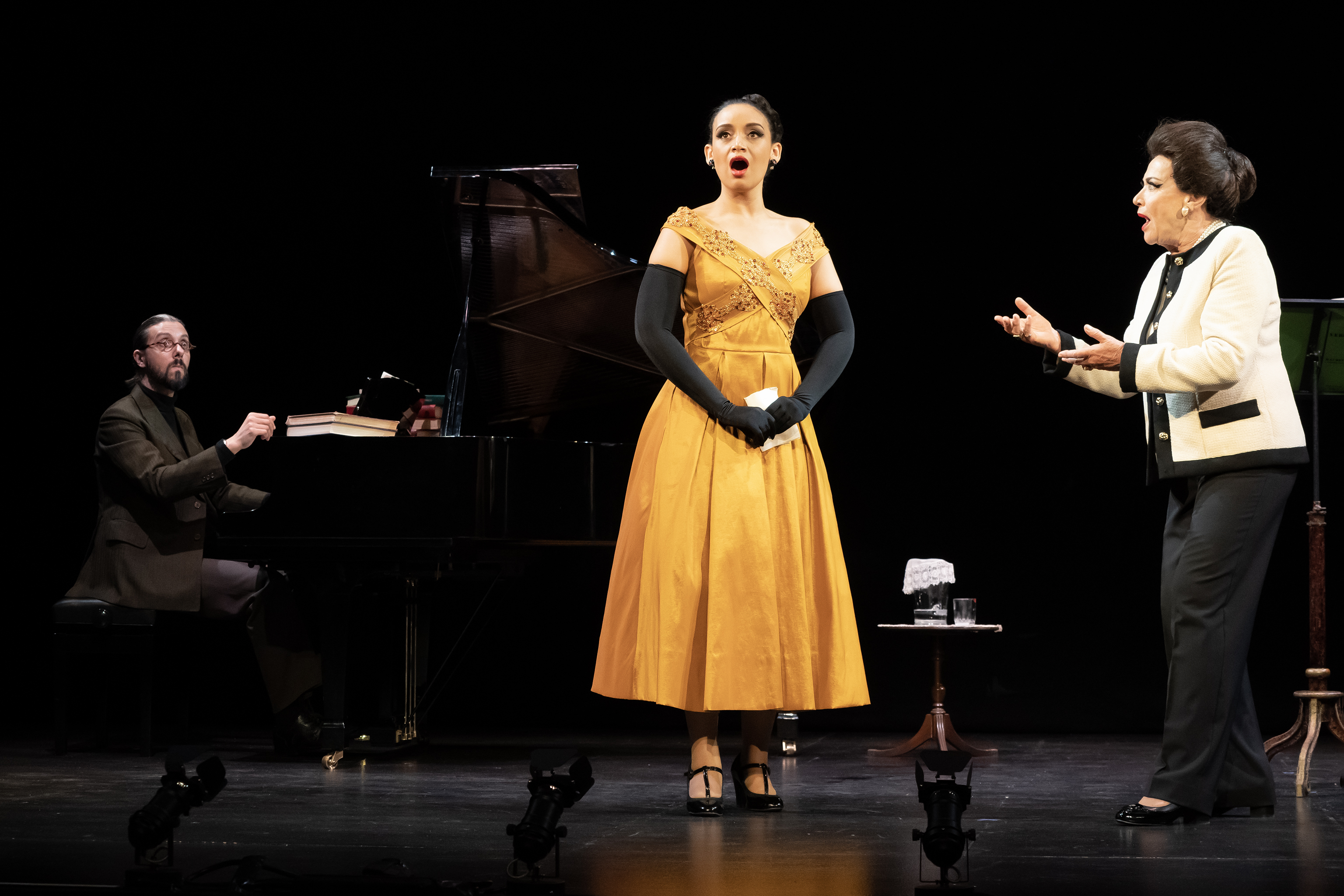
José Dias as Manny, Brittany Smith as Sharon and Sandra Prinsloo as Maria Callas in ‘Master Class’. Image: Joan Ward
Keeping it fresh
This ability to be in the moment, Prinsloo believes, is what keeps each role and every performance fresh.
“I’ve been doing this for over 50 years and I don’t know how I do it,” she says. “I just know that every performance has to be fresh and, for me, every performance is fresh.
“If you are truly in the moment and you work spontaneously – off the audience, off the script, off your fellow performers – then it is fresh, and you have that energy to do it.”
Prinsloo speaks about theatre’s ability to transcend the here and now while sipping black rooibos tea – “my witches’ brew”, poured from a flask. “I haven’t had coffee for 40 years, and I’ll probably leave the planet if I drink it,” she says.
She still vividly recalls the moment when she knew she would devote herself to acting. It was during a production of Jean Anouilh’s Eurydice: “I was young, probably 20, and I wasn’t sure if I wanted to be an actress because I was scared I wasn’t good enough,” she says.
“One night when Marius [Weyers] and I were on stage, there was a beautiful scene between Orpheus and Eurydice, when she’s come back from the dead, and suddenly there was complete magic in that theatre.
Visit Daily Maverick’s home page for more news, analysis and investigations
“It was as if a sort of sparkly, magical net had fallen over the stage, the most extraordinary, moving experience. That was the night I decided this was what I wanted to do with my life – discovering that real magic can happen on stage.”
That magic, she says, still happens. There will be performances where she reaches the end of a show and is unaware of the time that has passed, unable to fathom how she arrived at the end of the play.
“I’ll start a one-woman show and, although it’s over an hour long, all of a sudden it’s over, and it’s a mystery where the time went. It’s that magic – being transported, being so completely in the moment that you forget about time, you forget about a headache, a sore tummy, a sore knee, a blister on your foot… Everything goes away and there’s just that wonderful sense of flowing.”
That flow, that ease and magic, typically happens only once the play is well into a run, she says. Until that point, there is always hard work, always rehearsals and the somewhat strange technical rehearsals, and always a lot to learn.
“With every play you learn new things, you go to new places. Each play asks different things of you,” she says. “It’s like climbing a mountain. You never get used to it.”
With that, she smiles so warmly, walks into the theatre, and returns to the stage to rehearse. For the rest of the day, she continued to pour every ounce of her being into her craft. DM/ML
Master Class is directed by Cape Town Opera’s artistic director, Magdalene Minnaar, with musical direction by José Dias, who also appears in the show at the piano. It plays at Theatre on the Bay in Cape Town from 22 February until 11 March, after which it will transfer to Pieter Toerien’s Theatre at Montecasino in Johannesburg from 15 March to 2 April. Tickets via Webtickets.




















 Become an Insider
Become an Insider
Comments - Please login in order to comment.